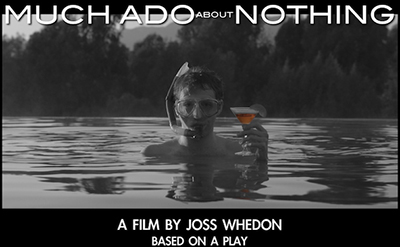 Film: Much Ado About Nothing
Film: Much Ado About Nothing
Director: Josh Whedon
Genre: Comedy
Lovers, Liars, and Tongue-Lashings
“I had rather hear my dog bark at a crow, than a man swear he loves me.”
~said by Beatrice in Much Ado about Nothing
At times this film reminds me of the Seinfeld episode in which, after some carefully laid plans have once more gone awry, Elaine finally admits the truth we’ve all been witnessing, not only in Seinfeld but in all the sitcoms we love: “What kind of life is this? I’m not a woman! I’m a child!”
In this play, Shakespeare delivered a deceptively lighthearted portrayal of what It’s like when children play God. We observe an enchanted world, the domestic lives of the upper crust, polished to a sheen by years of tradition and improvements in quality control. This version of Much Ado about Nothing makes salient the sense of immaturity coupled with the arrogance and entitlement that plagues ruling classes, especially during periods of cultural decadence. In it, we’re audience to a houseful of the rich and powerful of Messina, the men having just returned from battle, and all they can do is engage in tricks and romantic intrigues.
When Don John convinces Claudio that his dream girl, Hero, is unfaithful, Claudio guards his rage until his wedding day, when he spews out a rant that would sound like a WWF diatribe if it weren’t expressed in such richly metaphoric Elizabethan English. The families are shocked by news of Hero’s infidelity. The crisis is believable not because these people are so virtuous, but rather because Claudio’s love for her is so intense and romantic that allegations of her infidelity turn him quickly into a raging cuckold.
Hero’s own father believes the rumour and is ready to kill her for her ?crime.? The friar, a sweet soul, comes quickly to the rescue, delivering the reminder that human life must never be sacrificed to moral outrage. He cautions truth and patience, two things all Shakespeare’s characters might note, considering that most of the crises in his plays result from swift overreactions to false information.
Hero’s cousin, Beatrice, is a classic example of the female whose desire for masculine power causes her to despise her own sexual identity, an identity that nonetheless has granted her a tender and faithful heart. Her desire for power draws her into endless battles of wit with Benedick, a ladies’ man whom she secretly admires, while her desire to avenge the besmirching of her cousin’s name makes her demand Claudio’s death.
The magical soundtrack brings out the playful transcendence of the script, especially the song ?Sigh No More,? a lovely modern rendering of the song in the play “converting all your sounds of woe/into ‘Hey nonny nonny'”.
Is there a downside? The decision to make this a black and white film seems to have been a bit of a flub especially when we see the lovely estate (the director’s) which appears to be at the apex of summer greenery. Whedon said he wanted a film noir look, which is a bit incomprehensible for both the setting and the script.
Much Ado about Nothing also loses points for some awkward acting; yes, It’s a feat doing Shakespeare in modern English but some of these lines transpose easily to a modern accent and phrasing. If better said they would have sounded more natural?and more humorous. However, Amy Acker, who is easily the best actor in the film, plays Beatrice remarkably well. She’s charismatic, believable, and unfailingly charming in every scene.
It’s always fun to see what directors do with Shakespeare in modern dress, and no less here. The film is well informed by the television experience of Gen X, and not just Seinfeld. For example, the director admits that Law & Order: SVU inspired the filming of the police scenes. There’s also a nice touch at the end where Don John’s arrest is shown on a smartphone. So, in that respect, It’s a good vehicle for introducing Shakespeare to a new generation
Like it or not, at least in Shakespeare’s view, love is heavily dependent on context. But is that such a bad thing? Does it make love less marvelous? Apparently not.
Much Ado About Nothing manifests six of the Mindful Bard’s criteria for films well worth seeing.
1. It is authentic, original, and delightful;
2. It poses and admirably responds to questions that have a direct bearing on my view of existence;
3. It provides respite from a sick and cruel world, a respite enabling me to renew myself for a return to mindful artistic endeavor;
4. It inspires an awareness of the sanctity of creation;
5. It displays an engagement with and compassionate response to suffering;
6. It makes me appreciate that life is a complex and rare phenomena, making living a unique opportunity.


